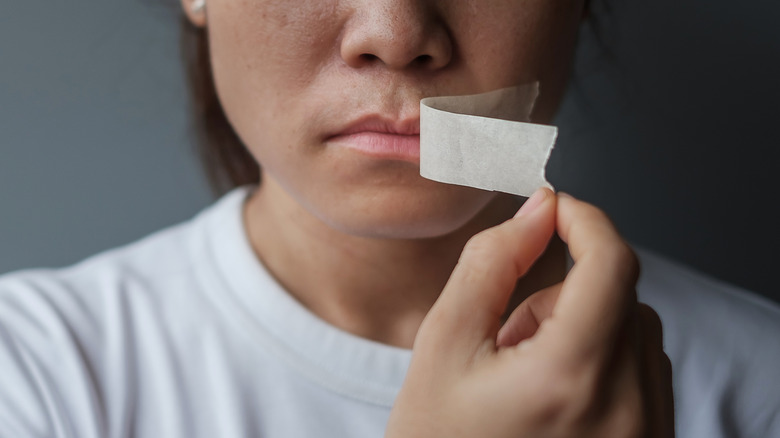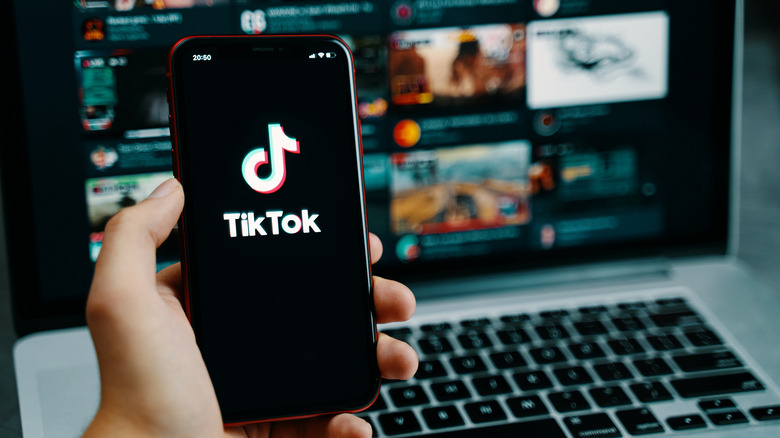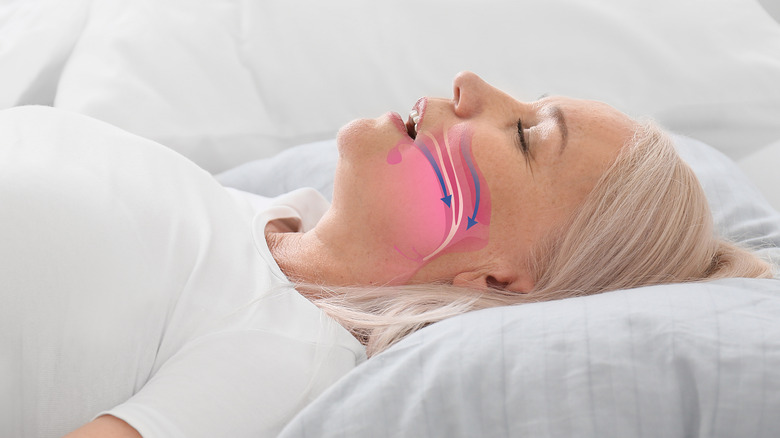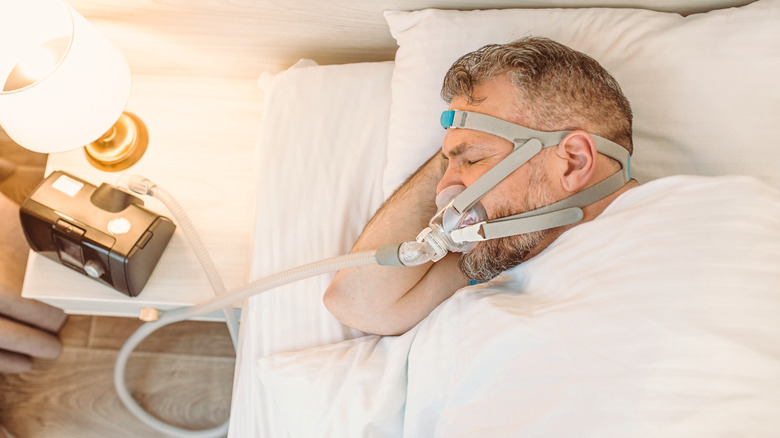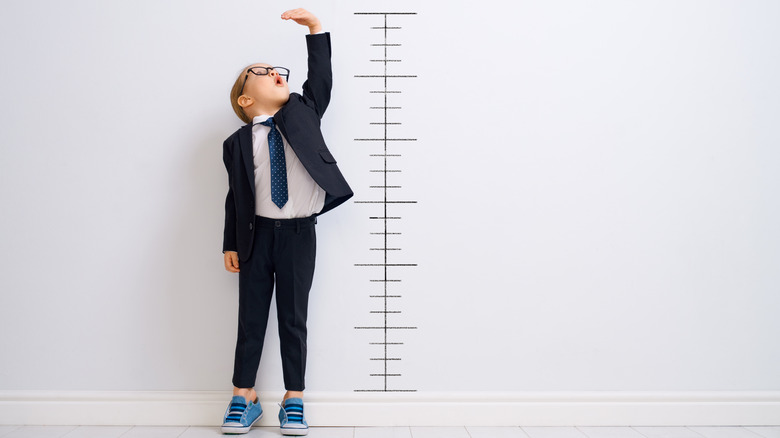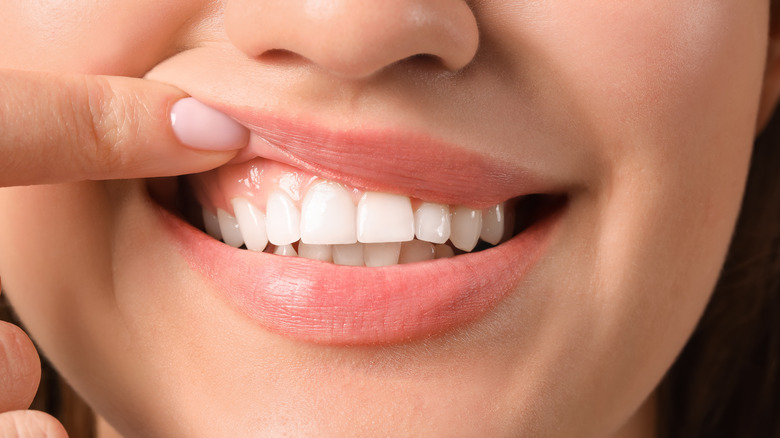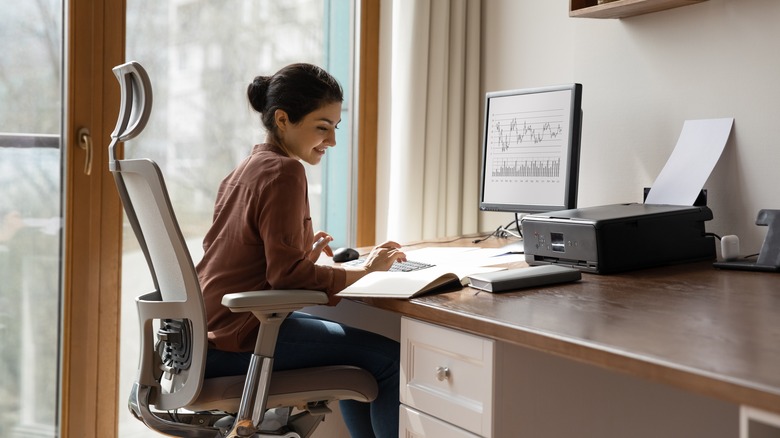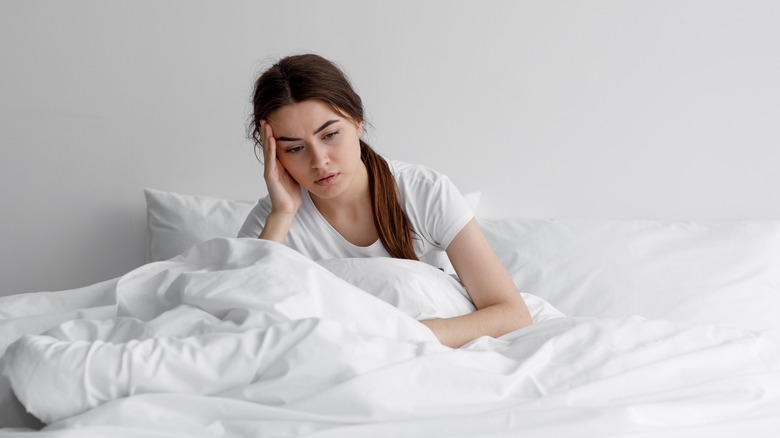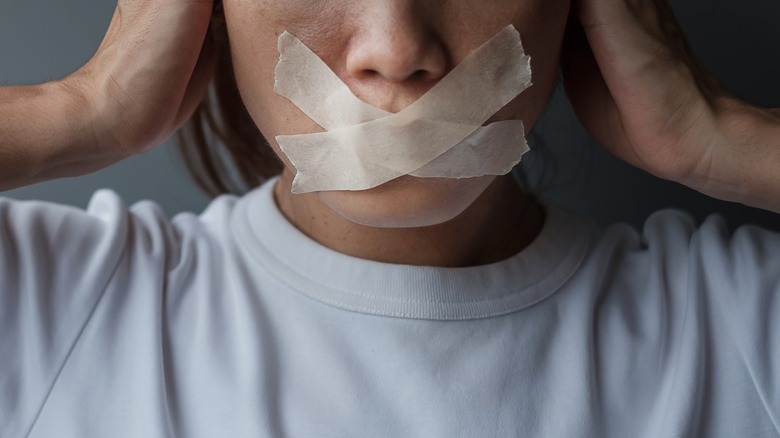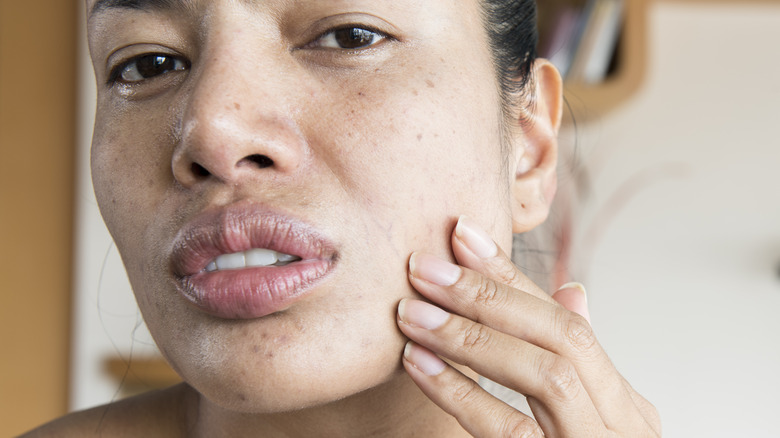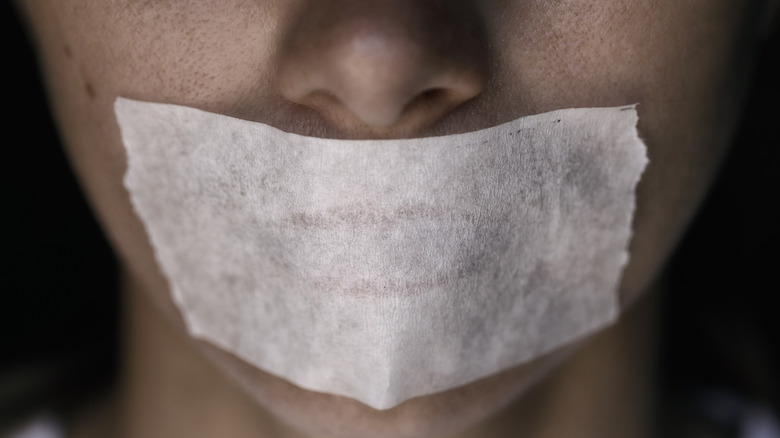Mouth Taping Explained
Some people have begun confidently and successfully taping their mouths shut while they sleep, while the mere idea of the practice induces panic in others. But what seems like a strange practice may actually have lasting positive impacts on an individual's health. Peer-reviewed evidence on mouth taping is scant, but it is known that mouth breathing — while awake or asleep — can cause a variety of problematic health effects (via Healthline).
The idea of mouth taping has been quietly gaining momentum over the past 10 years, but it recently became a viral topic of conversation after TikTok users started to share their experiences (via Vice).
Author Patrick McKeown, a long-time proponent of mouth taping, presented a Ted Talk in 2016 titled "Shut Your Mouth and Change Your Life." In the talk, McKeown testified, "Through your breath, you can influence the 100,000 miles of blood vessels throughout your body, you can influence the amount of oxygen that's delivered to your cells, you can open up and decongest the nose, you can open up the lower airways, and you can achieve a state of calmness in a state of anxiety."
If you're curious about mouth taping to alleviate health issues, the first step is to consult with your physician to get medical advice and plan the right approach for you. Let's take a look at the negative effects of mouth breathing and why some doctors and researchers are suggesting mouth tape to boost sleep quality and overall health.
Mouth taping gained popularity on TikTok
TikTok hashtag #mouthtaping has over 8 million video views on TikTok alone. Users have traded tips and tricks such as nightly routines, the type of tape to use, and first-hand accounts of the benefits they say they have experienced from mouth taping.
TikTok user @corylrodriguez has admitted to taping his mouth on a nightly basis and has posted to teach others about his experience. Commenter @darlenetownsend affirmed to him, "I do the same thing!!!" She added, "After using CPAP therapy for over 20 years, this was a GAME CHANGER for me!!!" Other commenters made anecdotal reports of better sleep, less snoring, and less inhaler use for asthma.
Some previous TikTok trends have given the app a bad rap and even caused injury to users — remember the Tide Pods phase? But Dentistry IQ has deemed the viral mouth taping videos as a potentially worthy TikTok trend. Teresa Power DeNike, the founder of Sleep Better NYC, said that the discipline of mouth taping may ensure that a user experiences the maximum benefits of nose breathing.
Mouth taping is part of the Buteyko method
Despite the resurgence on TikTok, mouth taping actually has been around for at least 70 years! The act of taping your mouth to encourage nostril breathing is part of what is known as the Buteyko method. The method as we know it was first developed in the 1950s by Ukrainian doctor Konstantin Pavlovich Buteyko. Dr. Buteyko's intentions were simple: improve breathing and eliminate or reduce the negative side effects of mouth breathing. The Buteyko method consists of mouth taping at night and seven additional exercises to help individuals switch from mouth breathing to nostril breathing.
The Buteyko Clinic in Ireland was founded in 2002 by author Patrick McKeown. On the clinic's website, functional breathing is described as effortless and involving the diaphragm muscle, while mouth breathing tends to happen in the upper chest. Breathing habits can be a result of lifestyle or environment, but oftentimes the way we breathe is determined by genetic predisposition.
The Buteyko Clinic has claimed that the method can help with asthma, COPD, rhinitis, cystic fibrosis, high blood pressure, insomnia, snoring, sleep apnea, stress, panic attacks, and depression.
Nostril breathing is the healthiest way to breathe
When it comes to optimal breathing, the nose knows. The nose warms and humidifies the air as it passes through the nostrils. The paranasal sinus cavities produce nitric oxide, an odorless gas as well as a molecule that is produced in the body. Nitric oxide is a vasodilator, which means it can dilate the blood vessels to help move blood through the body with less resistance and deliver oxygen to the body more efficiently. As we breathe in, the air picks up nitric oxide through the nose and carries it down to the lungs (via Modern Family Dental Care).
Conversely, when a person breathes through the mouth, these nose breathing benefits are lost. According to the Oral Health Group, mouth breathing is viewed as shallow, inefficient breathing that may cause a person to sigh frequently or feel short of breath. Individuals may have difficulty sleeping and even poor posture due to mouth breathing.
Taping the mouth may help with sleep apnea
There may be evidence to support the positive effects of mouth taping on sleep apnea and snoring. Sleep apnea, a type of disordered sleep breathing that causes breathing to stop and start multiple times throughout a sleep session, can occur hundreds of times over the course of a night if a person has a severe case. It can cause oxygen desaturation and increased carbon monoxide levels in the blood, which can lead to chronic conditions such as hypertension, stroke, arrhythmia, cardiovascular conditions, and more, a 2022 study published in the International Journal of the Science and Practice of Sleep Medicine has reported.
When a person sleeps with an open mouth, the tongue relaxes toward the back of the mouth, causing collapsibility of the upper airway and less room for air to travel down the airway, the European Archives of Oto-Rhino-Laryngology and Head & Neck added in another study. Air breathed in through the mouth while a person is sleeping also creates instability as it vibrates the soft tissue in the mouth, according to SnoreLab.
A 2014 study published in Otolaryngology — Head and Neck Surgery found that snoring was significantly improved in patients who slept with their mouths taped. Although mouth taping is considered a potential treatment for sleep apnea symptoms, some researchers warn that symptoms may worsen when the mouth is taped. Talk to your doctor or a sleep specialist if you want more information about treating sleep apnea by mouth taping.
Mouth taping may help with growth in children
Mouth breathing can be especially harmful to children's development. Stanford University researchers estimated in 2014 that 10-25% of children breathe through the mouth when sleeping (via Enliven: Pediatrics and Neonatal Biology). Human growth hormone (HGH) is released while we sleep, and disrupted sleep can negatively affect this process. HGH is responsible for long bone growth and brain development in children, and HGH is stimulated by deep breathing into the lungs while sleeping — which is achieved by breathing through the nose.
Children who breathe through the mouth may also experience negative effects on facial features as they grow into adulthood. According to O'Shea Dentistry, children who predominantly breathe through the mouth while sleeping may grow into adulthood with malformed facial features.
Taping the mouth while a child sleeps can encourage and even retrain the child to breathe through the nose. It's important to speak to the child's doctor or a sleep specialist for guidance on mouth taping.
Mouth breathing can cause behavioral symptoms in children
Mouth breathing may lead to child behavioral issues such as emotional outbursts, moodiness, and symptoms that are often confused with or misdiagnosed as ADHD. In a 2021 study published in the International Journal of Clinical Pediatric Dentistry, researchers found that 73% of children with sleep-disordered breathing had difficulty paying close attention in school. Other common symptoms in this group of children included the delayed onset of sleep and overall daytime sleepiness.
On her website, Dr. Mary Anne Morelli Haskell explained that 10% of children snore regularly. She added that while some children begin mouth breathing in the first year of their lives, it commonly occurs between ages 2 and 6. To help with mouth breathing, some parents have turned to mouth taping for their children, but it has mixed reviews when it comes to medical professionals. On his TikTok, dentist Dr. Mark Burhenne is a proponent and has stated that he believes taping helps with improving a child's sleep quality.
Dr. Jennifer McVige with the Dent Neurologic Institute, however, is an opponent of the idea of taping a child's mouth for sleep. In 2019, she told WKBW-TV, "It's very challenging when you're sleeping to defend yourself against stopping breathing, and it's incredibly concerning. With children, they don't know any better, and they don't know how to take a bandaid off, let alone tape over their mouth."
Mouth breathing can lead to oral health issues
Sleeping with an open mouth can lead to many oral health issues, and many adults use mouth tape to combat the problem. Dental researchers at the University of Baghdad's College of Dentistry have explained that mouth breathing during sleep causes the body to take in air that has not been warmed, humidified, or filtered. The consequences can be inflammation of the gums, dry mouth, a decrease in pH in the mouth, changes to saliva production, and an increase in bacteria in the mouth. Saliva is essential for a healthy mouth as it neutralizes acid in our mouth and washes away bacteria.
Dentists at O'Shea Dentistry have agreed and also warned against the negative effects of a dry mouth. Gum disease, they said, can be caused by dry mouth, and gum disease can lead to chronic problems such as bad breath, stroke, heart disease, and heart attacks.
Mouth tapers could see improved concentration
Just as children can show symptoms similar to that of ADHD, adults who primarily breathe in with the mouth can also struggle with concentration and focus. That's because deeper, more quality sleep is directly linked to the ability to focus and concentrate when awake. Conversely, sleep deprivation is linked to problems with attention, working memory, long-term memory, and decision-making according to a 2007 study by Neuropsychiatric Disease and Treatment.
Reaction time also lengthens, and there is a diminished ability to respond to environmental signals when a person does not get enough sleep (via Harvard Health Publishing). Having lower concentration and focus can be a nuisance for the typical student or employee, but it can also have dire consequences. When a person is driving, operating heavy machinery for a job, or tasked with caring for others, lack of concentration or focus can become particularly dangerous or even deadly.
Some dentists have recommended mouth taping to assist with deeper sleep. Dr. Mark Burhenne, DDS, encouraged mouth taping for a patient and reported seeing unexpected results. "She has better focus, memory, and concentration. Her anxiety is greatly reduced, and she also hasn't had a cavity since," he reported (via Ask the Dentist).
Mouth taping may help reduce anxiety
There are times when it's appropriate and even necessary to breathe through the mouth, and that's because mouth breathing allows the individual to take in a greater volume of air. For example, when exercising, we need to keep up with the demand for oxygen by taking larger breaths through the mouth.
When the body is under distress or threatened, it switches to fight-or-flight mode, and breathing through the mouth is a function of this mode. However, breathing through the mouth while sleeping can trigger the mind to believe it is in that protective fight-or-flight state (via Transformation Nutrition).
According to Dr. Paul Henny, DDS at Dental Sleep Practice, this type of breathing can signal the brain to release adrenaline and wake us multiple times throughout the night. Individuals can wake feeling exhausted and anxious, which is why dentists like Dr. Henny have recommended mouth taping to end this cycle of waking. Dr. Henny has suggested that mouth taping can help you get deeper, more restful sleep, less grogginess when you wake up, and a reduction in feelings of anxiety.
Mouth taping can be safe for skin when you use the right product
For someone who is ready to try the mouth taping method, there are some important factors to keep in mind. Using the right type of tape is important when mouth taping, the Sleep Foundation has reported. If an individual were to try the taping trend with common household tapes such as duct tape, shipping tape, or painter's tape, there could be disastrous results. That's because the adhesive used in common household tapes is not safe for the skin.
If a rash develops from mouth taping, the reaction is likely due to irritant contact dermatitis: when your skin is irritated by something with which it has had prolonged contact (via Nursing).
Micropore paper tape is the best type of tape to use when mouth taping, adhesive manufacturing company Strouse has reported. It can be used long-term and is hypoallergenic, which means the adhesive used in the tape should not irritate the skin during prolonged contact, such as an overnight session. Still, some individuals cannot tolerate any type of tape on the skin and should stop using tape altogether if irritation occurs.
There may be unpleasant side effects from mouth taping
In addition to skin irritation and facial hair-pulling, there are other potentially harmful or unpleasant side effects from mouth taping. Many people would never try mouth taping for fear of inducing panic, and it turns out that can certainly happen. According to the Sleep Foundation, some individuals may end up feeling anxious or uncomfortable with tape over the mouth and find themselves unable to adapt to the feeling over time.
Mouth taping can also make a person feel like they are having a difficult time inhaling and exhaling if the person is used to breathing through the mouth. According to Colgate, the discomfort of mouth taping can lead to insomnia, which defeats the purpose of trying to get better quality sleep. Those interested in trying out the technique are encouraged to speak with their medical providers to determine whether the option is right for them.
How to tape your mouth for sleeping
So, you've read the pros and cons and seen a variety of social media testimonials and have now decided you want to try the trend. Editor and journalist Tiarra Mukherjee tried mouth taping and shared her experience with Everday Health. She suggested finding the right tape and using a thin layer of vaseline to reduce stickiness.
Mukherjee also recommended tearing off an extra bit of tape in order to create what she described as "mini handles" so as to assist in removing the tape should you need to temporarily take it off it throughout the night or when you wake in the morning.
If you are scared to try the trend, Mukherjee and the doctors at Ask the Dentist provided a suggestion: Wear the tape during the day first to help you adjust. Taping during the day can help ease the anxiety of taping at night, and it can also show you how difficult it is for you to switch to nose breathing. If you are concerned with nighttime habits and you know that mouth taping is not for you, a sleep study may be your best option.
